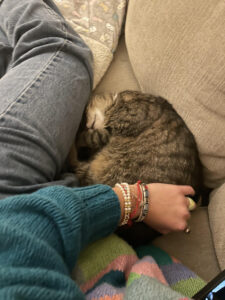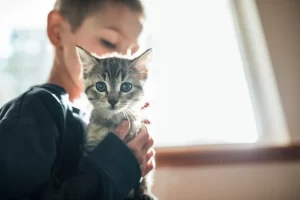
By Lauren Puckett
From the boy throwing a stick for his dog, to the girl cuddling up with her cat, there’s simply no bond like that of a child and his or her companion animal. Pets can play many roles in a child’s life, including playmate, cuddling companion, and friend. In honor of National Kids and Pets Day on April 26, let’s explore the many ways fostering or adopting a pet can benefit children.
#1 Pets improve mental health
Pets comfort us. But more than that, studies have shown they can improve our mental health. In fact, a 2015 study demonstrated that having a pet dog in the home was associated with a decreased probability of childhood anxiety.
#2 Pets teach valuable social skills
Pet ownership requires a child to love, care for, and treat an animal with respect. Playing with a cat or dog allows children to learn about reciprocity and “give and take.” Pets also teach boundaries, tolerance, and acceptance. These are all valuable skills that help a child learn how to interact with other living things.
#3 Pets impart a sense of responsibility
Children can learn responsibility by caring for a pet. For instance, they’ll learn to feed their pet, or in the case of a dog, walk it so it can take care of business. Plus, a pet needs training, which offers the opportunity to teach children about positive reinforcement.
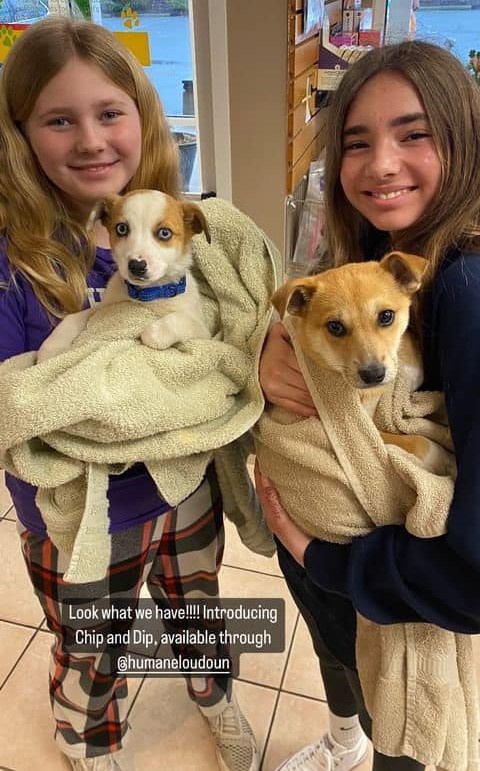
– Blaire Elizabeth Ring
#4 Pets encourage physical activity
Dogs require regular walks and outdoor time, encouraging physical activity for children. Even cats may enjoy a spirited romp about the house with their favorite child.
#5 Pets teach us about loss
As difficult as losing a beloved pet may be, this is a valuable teaching opportunity. It may be a child’s first experience with death, and they can learn useful coping skills for the future. Fostering a pet can also provide this lesson in a gentler way, as children say goodbye to a foster pet when it moves on to its forever home.
To introduce a cat or dog into your family, apply to foster or adopt an animal today.
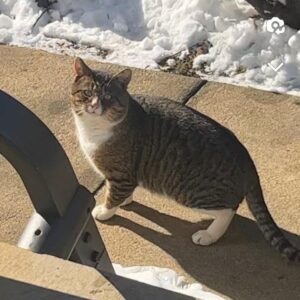
By Lauren Puckett
Volunteers who feed and monitor the well-being of feral cat colonies are called Community Cat Caretakers. One of our caretakers shared this feel-good story about a community cat named Toby.
Double Dipping
In January 2024, HSLC received two separate requests for Trap-Neuter-Return (TNR) for cats at two different colony sites. The cat at one site was not a regular; they called him “Chunky” due to his portliness. The cat at the other site was named “Toby” and his caretaker, Michael, was slowly making friends with him. Well, it turns out that Chunky and Toby were the same cat! At 14-pounds, this resourceful kitty had been “double-dipping” by feeding at both sites.
Fast forward to February, Toby was neutered, vaccinated, and microchipped through HSLC’s TNR program. When he returned, Michael asked if he could give Toby the opportunity to adjust to life as a house cat. If the indoor life didn’t work out, Toby could go on being loved and cared for in Michael’s backyard.
Adjusting to the Indoor Life
Toby was scared at first given his new surroundings. And, he often wanted to be alone which made socializing the handsome boy a challenge. But, Michael was patient and spent as much time with him as possible even when the cat didn’t reciprocate the attention.
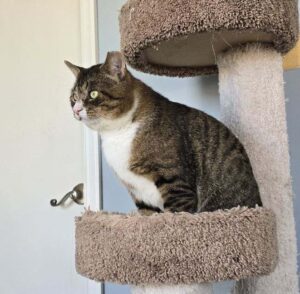
Within a month, Michael’s persistence paid off and Toby was loving his new life as a homebody. He has become very friendly, sweet, and grateful for his happy ending!
While it is true that not all cats belong inside – there are many cats that deserve a chance at the indoor life. Check out the HSLC adoption page to learn about several formerly outdoor cats hoping to follow in Toby’s paw-prints.
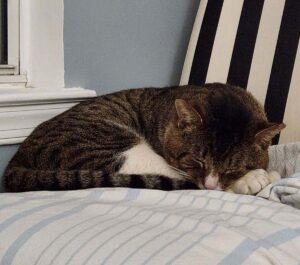
Also, if you are interested in becoming a Community Cat Caretaker, get started by completing an application on our website. On-site training is available.

By Lauren Puckett
On April 8, 2024, a total solar eclipse will cross North America, passing over Mexico, the United States, and Canada. As the moon passes between the sun and Earth, it will completely block the face of the sun and the sky will darken as if it were dawn or dusk.
Now, we humans know not to look directly at the sun, especially during a total or partial eclipse (without wearing special protective glasses). But what about our pets? Here’s how to handle your pets during a solar eclipse:
First, stay calm. Our pets play off our own reactions and emotions. Since they take their cues from humans, the best way to keep pets calm during a solar eclipse is to stay calm ourselves. If we’re anxious, our pets may become anxious, too.
Second, keep your pets indoors. You may be tempted to bring your furry friends outside with you for an eclipse viewing party, but the safest place for them to be is at home. Crowds may trigger anxiety in dogs or cats, increasing the likelihood that they’ll try to run away. Additionally, your pet can suffer eye damage by staring directly at the sun (just the same as you can).
With these tips in mind, you can enjoy the solar eclipse knowing that your beloved pets are safe and sound.
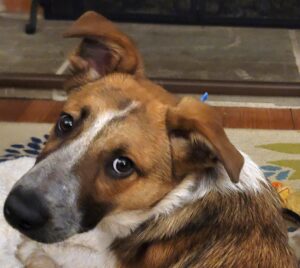
By Lauren Puckett
Did you know that the Humane Society of Loudoun County (HSLC) adopted out over 150 cats and dogs in 2023? And, because HSLC is a foster-based organization, we relied on dozens of people — just like you — to provide a safe landing for these animals until they could find their forever homes.
However, some of our foster families need a little help – particularly when they are out of town and unable to take their foster pets with them. That’s where YOU come in! Here are a few reasons you may want to consider becoming a vacation foster for HSLC.
It’s a great way to try out fostering
If you’ve ever thought about becoming a foster but weren’t sure if it’s right for you, vacation fostering is the perfect low-commitment opportunity. It usually lasts for a short time – a weekend to a week – and can help you learn if fostering is a good fit for your household.
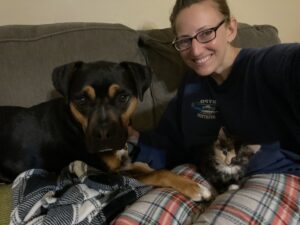
It’s best for the animal
Our preference is to keep animals in a low-stress environment. The alternative is temporary boarding which is expensive and takes funding away from other critical needs. Plus, it may be less enjoyable for our foster pets who are used to the comforts of a home.
It can help us learn about the animal
Vacation fosters provide a unique opportunity to observe an animal’s behavior in a new setting. As a temporary foster parent, you may gather additional information about a foster animal’s likes and dislikes. And, because your household may have a different mix of 2 and 4-legged residents, you’ll be able to observe how the foster animal interacts with them. This knowledge can be very helpful in finding a forever home most suited to the animal.
Ready to try out vacation fostering? Contact our Foster Coordinator at foster@humaneloudoun.org or complete a foster application today!
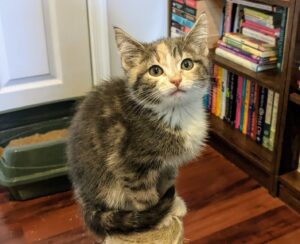
By Heather Nokes
“Kitten season” refers to the period from early spring to late fall when most kittens are born. This phenomenon is mostly due to warmer weather allowing stray or outdoor cats to venture out and begin procreating. Female cats become sexually mature as young as five months of age. In addition, because the gestation period for cats is only about two months long, they can have several litters in one year!
As kitten season ramps up, local shelters and rescues, like the Humane Society of Loudoun County (HSLC), are in dire need of kitten and cat fosters.
Why you should foster
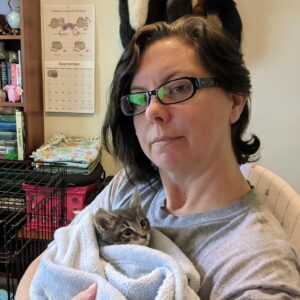
Andi, pictured with little Ramone, has fostered over 130 cats and counting!
Fostering kittens is a rewarding experience. As a foster, you save lives while enjoying all the adorable antics that make kittens irresistible. One of HSLC’s expert kitten fosters, Andi, has been fostering cats and kittens—over 130 in total—with her husband since 2012! She had this to say about her fostering experience:
“The best part [about fostering] is being able to watch them go from sickly to healthy or from angry/scared, hissy-spitties to lap-loving cuddlebugs.”
What to know before fostering
Andi states that while kitten fostering is fun, it can also be a lot of work. You must watch the little souls closely to ensure they stay safe. If something seems odd, do not be afraid to ask questions (HSLC has an awesome foster coordinator who can help!) Be sure to love them unconditionally, and be happy to see them go to great homes.
What you need to foster
Kittens should be isolated from other pets in the home until vetted and given a clean bill of health. This is why setting up a “home base” for them is important. If they are young, a large dog crate will work; if older, an entire room would be a better fit.
Your home base should consist of:
- Clean, fresh bedding that is easy to change and wash.
- Soft surfaces that are not too high up, nothing that a kitten could get stuck in (trash can, boxes).
- A shallow litter box with a small amount of non-clumping litter.
- Shallow water and food dishes that are easy to clean.
- A healthy and safe environment for their foster kittens; any cleaning products should be removed from the kitten foster room.
- Small, soft toys that are not easily ingested or torn apart.
Kitten Veterinary care
The Humane Society of Loudoun County will pay for the veterinary care of its kittens. The first couple of vet visits often include deworming and/or flea treatment. If the kittens are healthy enough, vaccines and FeLV/FIV tests may be conducted. HSLC also spays/neuters around 4 months of age. More complicated reasons for a vet visit include diarrhea, dehydration and upper respiratory infections. For these conditions, medications may be sent home with the foster to give the kitten regularly. A healthy kitten is a happy kitten!
Saying goodbye
Saying goodbye may be the hardest part of fostering. It is important to remember that this is why you fostered, for a happy, healthy kitten to find a forever home!
Interested in giving cat or kitten fostering a try? Complete a no-obligation application today!

By Carly Sanders
It’s no secret that animals like food. Some animals really like food, and most dogs and cats fall under that category. When you’ve got a pet that’s quick to scarf down scraps and isn’t too picky about what they’re made of, it’s important to know what is and isn’t safe.
Even pets who aren’t big eaters can still be at risk. Some harmful compounds can enter their bloodstream through contact with their skin, so it’s important to be aware of all products that you bring into your home that your animals may have access to.
Here at the Humane Society of Loudoun County, we want to help owners keep their beloved pets safe. Knowing about potential dangers around the house is a big part of that. By now, most of us have heard that things like chocolate and grapes are not safe for dogs, and it’s pretty common knowledge amongst cat owners that lilies can be harmful to cats. But did you know about these five lesser-known hazards?
Raw bread dough
There’s nothing like home-baked bread. While most humans prefer it after coming out of the oven, our animals are often less discerning. Make sure to keep that pizza dough far away from your pets, as dough containing yeast can continue to expand in the stomach after swallowing. This can lead to stomach stretching, a condition that can be fatal in severe cases.
Not only that, but as yeast ferments, it produces alcohol which can lead to alcohol poisoning.
Cooked bones
This one may seem surprising, but if you’re going to throw your dog (or cat!) a bone, make sure it’s a raw bone specifically meant for chewing. Cooked bones are more brittle than raw and can splinter more easily when broken by your pet’s teeth. When swallowed, sharp fragments can cause damage to the digestive tract.
If your pet loves the smell of fried chicken as much as my dog does, make sure to pay special attention and don’t leave that bucket unguarded!
Essential oils
Sniffing that bottle of tea tree oil might improve your headache, but keep it away from your pets, please! Many common plant-based essential oils, including tea tree oil, are toxic to cats and dogs. Other examples include wintergreen oil, eucalyptus oil, pine oil, and pennyroyal oil. These oils are harmful to cats and dogs when eaten and when applied to the skin.
Effects vary depending on the type of oil and the amount ingested. Symptoms range from stomach upset in mild cases to seizures and liver failure in more severe cases.
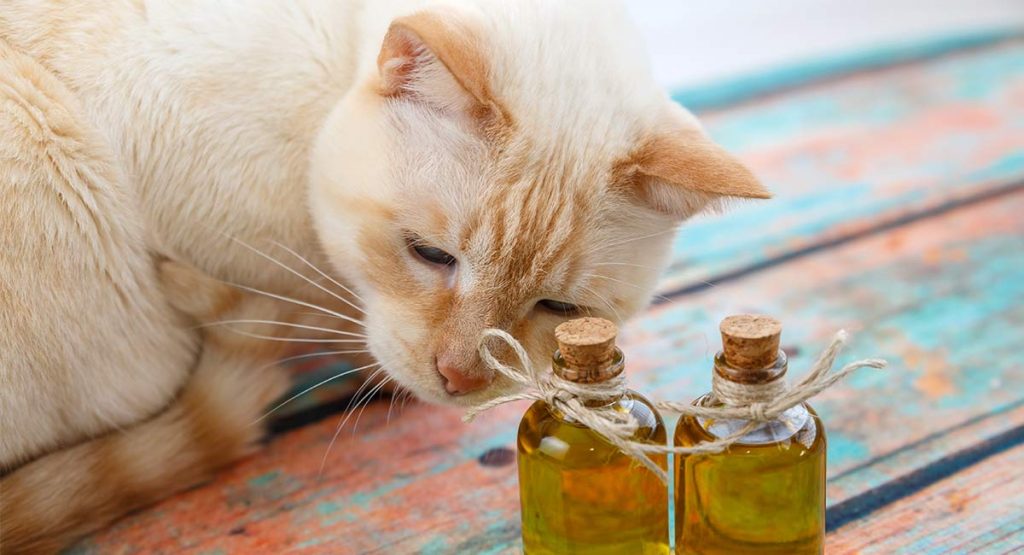
Rogaine
If you’re treating hair loss with the topical product Rogaine, take care to keep it away from anywhere your pets might like to hang out. Minoxidil, the active ingredient in Rogaine, is highly toxic to cats and dogs. Exposure can cause a dangerous drop in blood pressure for our four-legged friends.
Like with essential oils, Rogaine can affect your pet both through eating and through application to the skin. Many reported cases involve cats licking someone’s hand or head where the product was applied. Even small amounts can be harmful, with many reported cases involving only a few drops or licks worth of the product.
If you’re using any products containing minoxidil, be very careful to keep the product itself far away from your pets and take extra precautions to wash residue from your hands and any surfaces that they might come in contact with.
Xylitol
Xylitol, a common artificial sweetener, is highly toxic to dogs. Xylitol is found in many sugar-free food products and chewing gums, but it can also turn up in household products such as vitamins and toothpaste.
When it comes to cats, research is less plentiful. Serious side effects appear to be less common in felines, but more studies are needed. For now, we recommend playing it safe by keeping the ingredient away from pets of all varieties.
As for dogs, it’s well documented that xylitol causes severe low blood sugar, even in small doses. Higher doses can cause acute liver failure. Make sure to check for the ingredient in any new products you bring into your home, and pay special attention to anything labeled sugar-free or reduced sugar.
If you have reason to believe that your pet has been affected by any of these hazards, contact your emergency vet immediately to seek treatment. Knowing what to look for is the first step in protecting your loved ones, animals included! Make sure to be aware of what you or others are bringing into your home, and take precautions to keep anything potentially harmful far out of your curious companions’ reach.
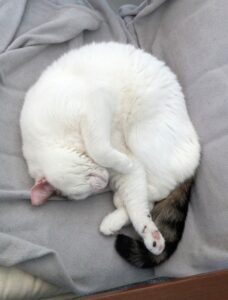
By Oliver Bittenbender
Caring for any foster animal can be a very rewarding experience. We recently published a blog about the reasons to foster an adult cat (vs. kittens). But we wanted to follow up with a foster story to bring these benefits to life.
Jill’s Story
During the pandemic, Jill Belsky adopted two fully grown cats. In her words, “I loved that we could adopt cats that had a rough past and provide them with a fresh beginning.” Jill loved the cats so much that she wanted to welcome more into her home. But, with a human family to care for, she couldn’t take in and keep as many cats as she wanted.
So, Jill found a clever compromise, “I thought fostering could be a great way to enjoy being with more cats, while also providing a beneficial service for animals in need.” So, she signed up to be a foster caregiver with the Humane Society of Loudoun County (HSLC). And, given that she already had a great experience with adult cats in her home, she was very open to fostering a mature cat like Briar Rose.
A Lot to Love
Briar Rose has made for a fantastic first-time foster experience. Having matured and mellowed out, she requires far less attention from her caretakers than kittens. As a standard best practice, Briar Rose was initially placed in a safe space–in this case, a spare room. This provided her with a chance to adjust to her new surroundings prior to being given free rein to explore the house. Before long, Briar Rose was snuggling right up to her new humans, showing how comfortable she was around them. She has also taken well to the other two cats, Robin and Edie.
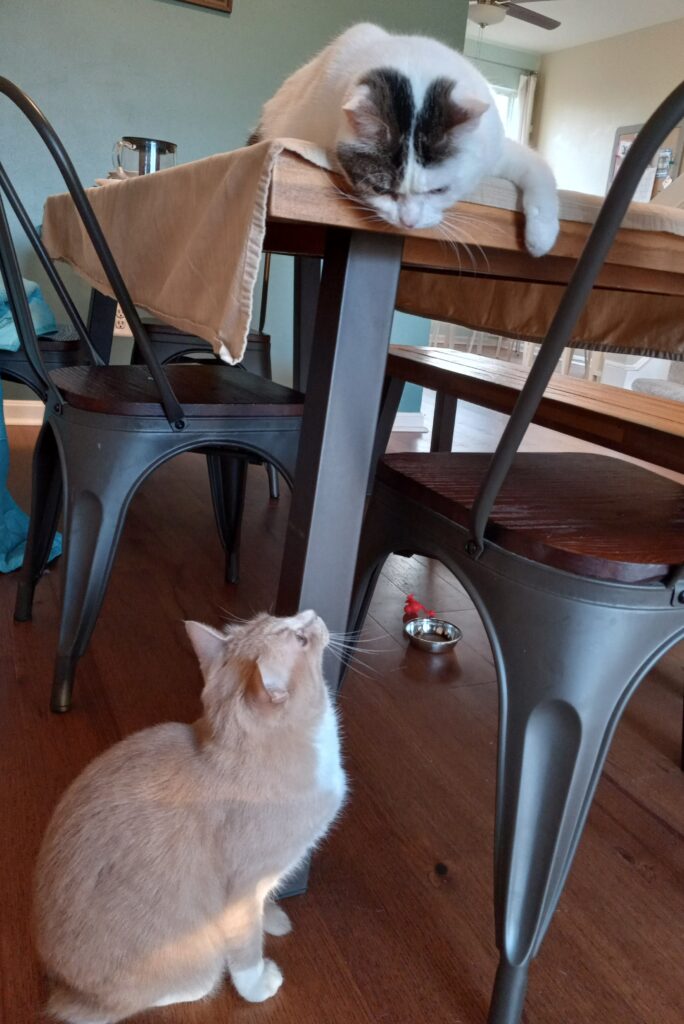
Jill finds that each cat “offers such unique interests, personality traits and ways of sharing their love.” From stroking her soft fur to watching her pounce at string toys and scratching posts, the Belsky family has found a lot to love about Briar Rose. Bonding with the new cat has been a rewarding experience for the whole family.
Words of Encouragement
Jill encourages those on the fence about fostering to think about the long-term difference they could make in a cat’s life for a relatively short-term responsibility. Homeless cats depend on kind people to be the bridge from their past to a happy and healthy life in a forever home. And though it may seem daunting at first, caring for a cat can quickly become second nature. “Before you know it,” Jill says, “you’ll likely fall in love with the foster cat, and any concerns you originally had become negligible.” Plus, with the care and support of the many amazing volunteers at HSLC, a foster caregiver is never alone in their journey.
Learn more about fostering with HSLC and complete a no-obligation application today!

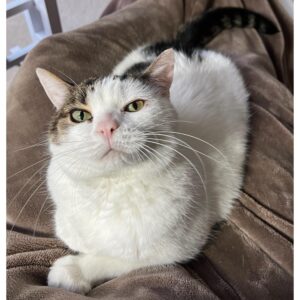
By Lauren Puckett
In 2024, Humane Society of Loudoun County (HSLC) volunteers fostered over 200 animals, most of them cats. Though some of these cats were kittens, there were plenty of adult cats who also needed foster families. Kittens are often in demand because they are so cute and cuddly, but adults come with their own benefits. Here are four reasons to foster an adult cat:
Less Demanding of Your Time
Kittens, especially young ones, need regular supervision. They are often underfoot and can cause humans to trip or stumble, potentially injuring all involved. Newborn kittens have stringent feeding requirements and need to be bottle-fed every two to six hours. This can be quite time consuming for the foster family. An adult cat, on the other hand, usually eats kibble on its own schedule.
Little or No Training Needed
While a kitten needs to learn to use its litter box, adult cats are almost always potty-trained and ready to go. This saves valuable time and effort – and messes – for the foster family. Kittens also need curtain climbing and scratch training while adult cats usually do not.
Calmer Temperaments
Kittens can be rambunctious and destructive, while adult cats are generally much more settled. They typically don’t have the same play or exercise requirements as younger cats and are less likely to get themselves into trouble.
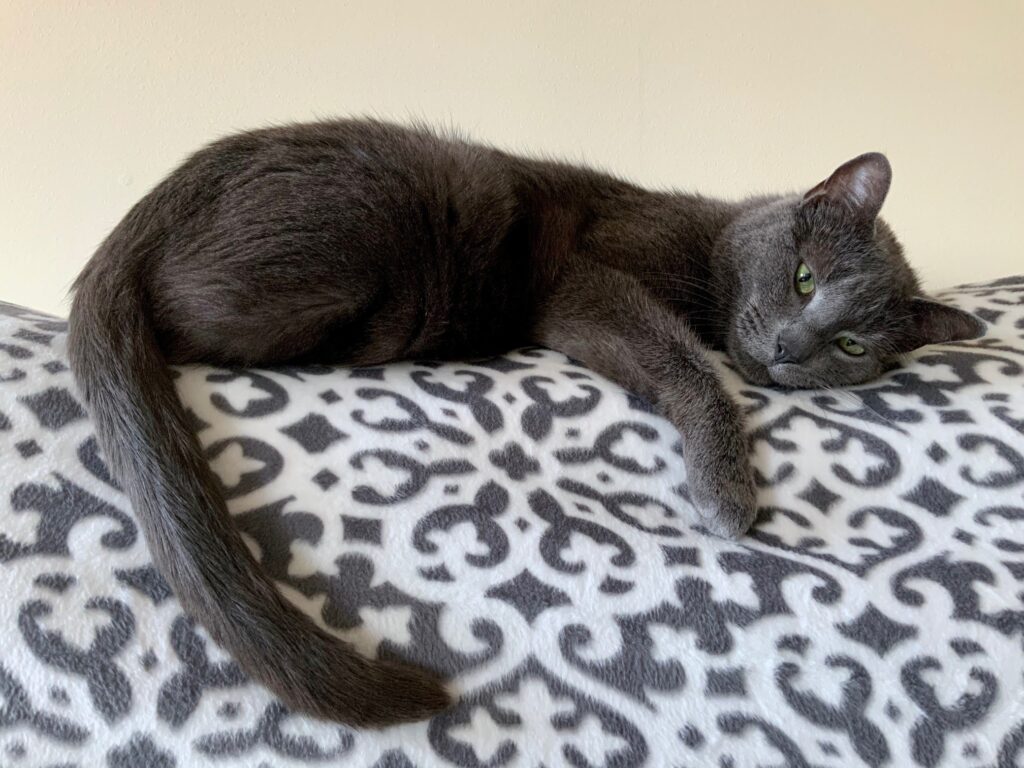
Lifesaving Potential
Finally, there’s something very rewarding about giving an older animal a second chance at a happy life. The cat you foster will be grateful to you for opening your heart and home to them. Because HSLC does not have a physical shelter, we can only save cats when we have a foster home to place them in.
Are you ready to save a life? Learn more about fostering an adult cat on our website and complete a no-obligation application today!

By Joan Cassell
With the recent snowfall here in Loudoun County, this is a good opportunity to take a mid-season look at your pet’s cold weather needs. If you think about it, your pets have the same basic requirements that you do: shelter, safety, water and food. So, whatever you do for yourself in winter, your pets will probably need something similar.
Outdoor Time
Like people, dogs are susceptible to frostbite and hypothermia and should be kept inside when the temperature is below freezing. Although many pets have thicker fur during the winter months, it is a common misbelief that dogs and cats are more resistant to cold weather than people because of their fur.
Short periods of outside time is great for exercise and will keep your dog* from getting bored. If you have a pet with a short coat, there is no shortage of really adorable sweaters and jackets available. When selecting pet clothing, be sure it is safe, comfortable and made of non-toxic materials. Your fur baby should be able to walk, see, and hear clearly.
*The Humane Society of Loudoun County does not encourage allowing domestic cats outside unless they are leash trained or in a contained area like an enclosed porch.
Food and Water
Cold weather and heated homes, especially those without a humidifier, can make pets extra thirsty. So, keep your pets hydrated by ensuring their water bowl(s) are always full and readily accessible year-round. If you have outdoor water bowls, check them daily to make sure the water hasn’t frozen.
Keeping warm uses more calories, so even short periods of outdoor play may require more food intake. If exercise does not increase significantly then you can maintain your pet’s regular food intake. If you have special concerns, as always, talk to your veterinarian.
Hazards
Ice and chemicals on the roads and sidewalks can damage paws. So, it is a good idea to moisturize your dog’s paws with petroleum jelly before heading out. And, be sure to clean those paws and legs after being outside. This will keep your pet from consuming harmful chemicals when they clean themselves. You may also want to consider pet booties to minimize contact with painful or poisonous substances like salt and ice melt crystals.
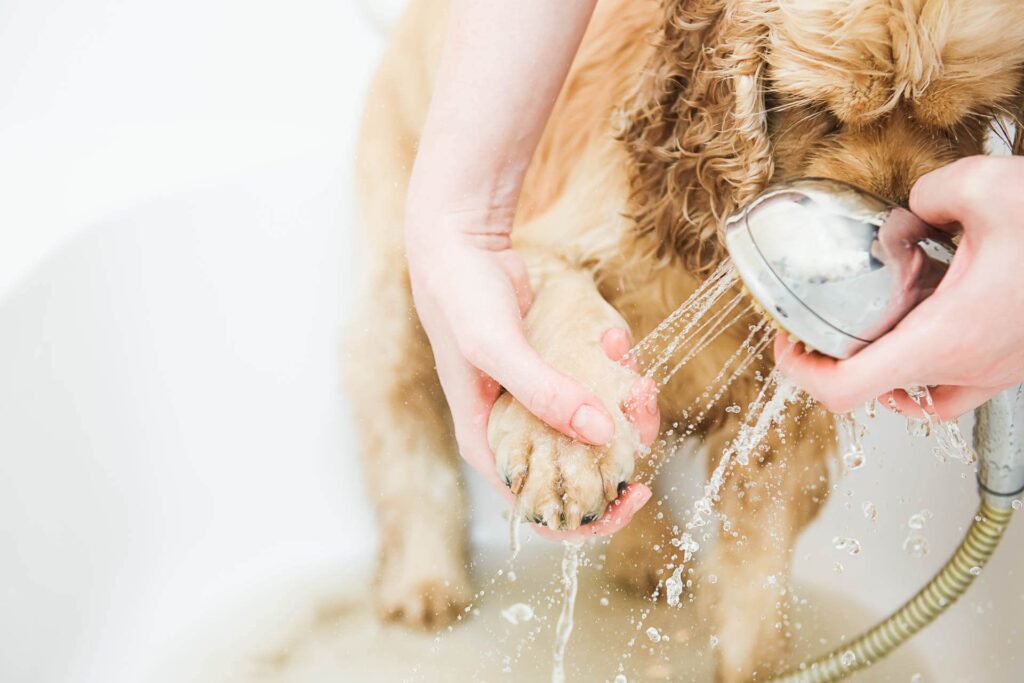
If your dogs are allowed to run off leash, always keep a very close eye on them to ensure they avoid frozen ponds, pools, lakes or other water sources. Unsupervised dogs may venture out onto a frozen area unaware of the dangers and get stuck in a bad situation. When in doubt, avoid these hazards altogether or keep your dog on a leash.
Lastly, notice your surroundings when you get ready to move your car. Sometimes stray and feral cats as well as other animals sleep in or under vehicles to stay warm. Before starting your car, honk the horn or bang on the hood to give any animals in or around your car a chance to escape.
Enjoy the outdoors with your pets for what is left of winter!
Looking for a cuddle buddy to snuggle with this winter? Consider fostering or adopting.
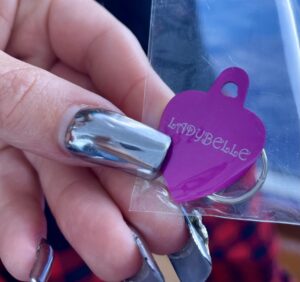
For most folks who celebrate Christmas, the tree has been taken down and the decorations stored away for another year. But, we had one more story bursting with holiday joy that we couldn’t keep to ourselves!
Supportive Fostering Experience
Ladybelle had been rescued by the Humane Society of Loudoun County (HSLC) in the fall of 2022. Despite her beauty, Ladybelle had trouble finding her forever home due to some sassiness. Fortunately, she landed with a patient and loving foster family, the Burbages, who helped her mature into a sweet young ladycat.
And, in turn, the Burbage family had the support of HSLC’s Animal Care Team (ACT). Mom Nicole had this to say about ACT Director, Amy Richards, “You have been an angel throughout this whole experience! Whether we had questions about behavior, medical issues or general cat questions, you’ve always been there for us as we navigated through the fostering experiences. As far as the Burbage family is concerned, YOU ROCK!!!”
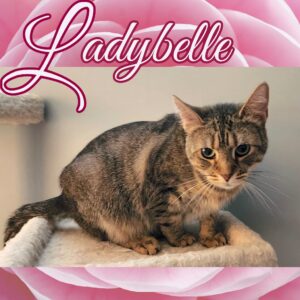
Extra Special Adoption
Now, the best “mews”. As a wonderful Christmas morning present, Nicole decided to surprise her children by officially adopting Ladybelle! Amy even created a special certificate to make the adoption extra official! After 15 months of fostering, Nicole feels that they finally have their happy ending. “We just love her to bits and pieces!”

Fostering to Adopt
Not all rescues allow fostering-to-adopt, but HSLC does. So, if you are thinking about adopting an animal, consider fostering first to see if they are a good fit for your household. Likewise, if you want to give fostering a try, don’t worry that you won’t be able to keep your foster cat or dog. Foster caregivers have the right of first refusal if they decide to add the foster animal to their family.
If you are new to fostering, you may find the following blogs helpful:
- Interview with a First-time Foster Mom
- How Do You Foster without Getting Attached? You Don’t.
- Pawsome Foster Stories
